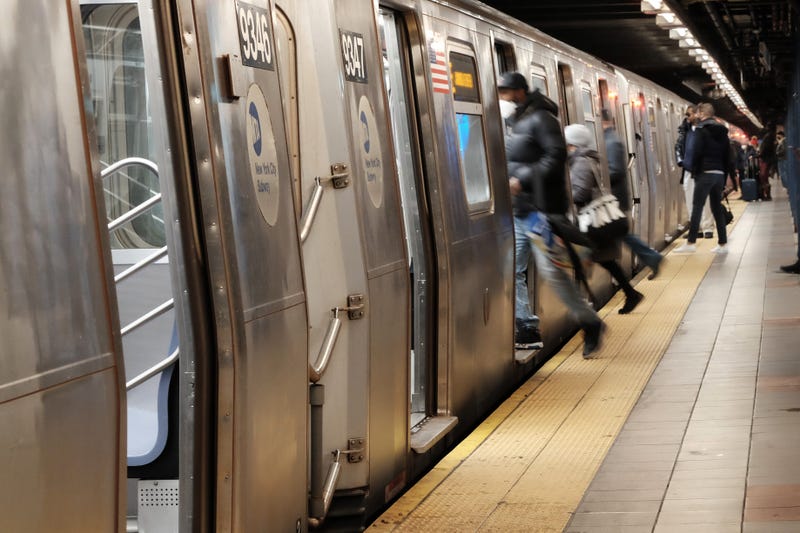
NEW YORK (WCBS 880/1010 WINS) -- Three people were attacked in the subway in Manhattan Monday night into early Tuesday—violence that followed a bloody holiday weekend in the transit system, with over a half-dozen assaults.
Monday night’s victims included an on-duty subway conductor who was pelted with rocks, as well as a woman and man who were assaulted during robberies, which have surged 87% in the system this year, according to police and a transit union.
The female conductor was attacked just before 8 p.m. aboard a train in Lower Manhattan, police said.
While police said the conductor was assaulted with an “unknown object,” Transport Workers Union spokesman Pete Donohue told PIX11 that a group of teens threw rocks at her and that she was struck in the face and chest.
The conductor was assisted by the NYPD and EMS at the Chambers Street station, leading to some delays on 2 and 3 trains, according to the MTA.
EMS transported the conductor to a nearby hospital as a precaution, as her injuries were not visible, police said.
A woman was also attacked on an L train in Lower Manhattan sometime overnight, police told PIX11.
The woman was aboard a train in the East Village when a man tried to steal her phone, according to the report.
The woman fought back, and the man shoved her into a handrail and fled, police said.
It’s unclear if the victim was injured in that attack.
A man was also attacked during a robbery on a northbound 1 train in Chelsea, police told the New York Post.
The victim was aboard a 1 train near the 28th Street station when another man, believed to be in his 40s, slugged him in the face and stole his cash, according to police.
The straphanger was taken to Lenox Hill Hospital with non-life-threatening injuries, police said.
No arrests have been made in the three attacks.
The assaults came after a rash of violence in the subway system over the weekend, including multiple stabbings and slashings. A woman was also beaten with a metal pipe.
Monday was also the first day that Mayor Eric Adams' new subway safety plan was implemented.
On his commute from Brooklyn to Lower Manhattan on Tuesday morning, MTA Chairman and CEO Janno Lieber took questions from reporters and greeted riders.
One commuter from Crown Heights expressed her concerns about crime in the subway system and the homeless.
"Every day you have something happen somewhere, so it is scary," the rider said.
Lieber said he understands the concerns and fears of customers.
"You know when people get on a train, especially if it's late at night and there aren't many folks on, and they see people engaged in breaking the rules in one way or another, whether it's smoking, or open drug use, or just like lying down and taking up five seats, they get uncomfortable, not cause they feel an immediate threat to their lives, but they see someone's breaking the rules, what else might they do?" Lieber said.
He is trying to manage expectations on when riders can expect changes and is determined "to always be honest with our riders about where we are."
"The good news is that we have better on-time performance than we did before COVID. The trains are cleaned every night, people are noticing that, but some of the impact of the COVID era has been that more people who are needing social services have come into the trains and are spending a lot of time there. We have to be honest with them, it may take a little while, but also they have to know that the problem is being attacked."
Lieber is putting a lot of faith in the mayor and governor's solution for the homeless who refuse help.
"They are going to find alternative settings for that community, for people who have those needs. I think that's a great strategy, and that's why I'm optimistic," Lieber said.

Advocates for the homeless were quick to criticize the effort, which relies heavily on policing. They're worried about criminalizing one of society's most vulnerable populations.
"We're not interested in putting people in jail, what we're interested in is having an environment where people can sit down, get where they're going, and not feel uncomfortable because there's a lot of rule breaking going on," Lieber said. "That's the goal and that's what the mayor of New York City is going to deliver."
The monthly crime report from the MTA shows the subways have become more dangerous.
Robberies underground are a major concern for the NYPD. They have nearly doubled, according to Jason Wilcox, the new chief of the NYPD's Transit Bureau.
"We're up 87% in robbery year-to-date—88 versus 47. We're taking a very hard look at that," Wilcox said at an MTA board meeting Tuesday.
Wilcox said visibility is key to making riders feel safer and assured that the Transit Bureau is working hard to have officers on the platforms and riding the trains.
"We will continue to be proactive. We want you to see us on the trains, on the platforms and the result of that. We want you to feel safer," Wilcox said.
He also said security camera footage is helping police make quicker arrests like the collar last week of a man who stabbed a break-dancer on the L train.
"Less than 24 hours later, transit officers see the male suspect wearing the exact same clothes and they were able to bring him into custody and arrest him," Wilcox said. "We quickly get our detectives involved. Over half, 52% of the 73 felony assaults so far this year have an arrest attached to them. The others are being actively investigated by our detectives."
Police will also crack down on quality-of-life issues. According to Wilcox, 9,600 of the 12,000 summonses issued this year were for fare evasion.



